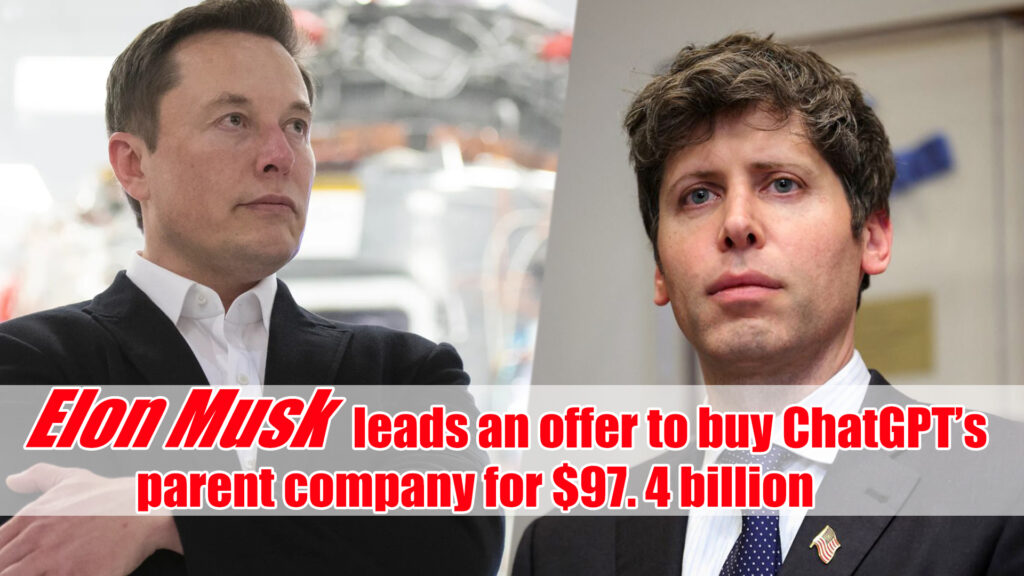
The $97. 4 billion bid by a team of investors spearheaded by Elon Musk to take over OpenAI – the original home of ChatGPT, a state-of-the-art AI model – has left many individuals amazed, especially those in the technology sector. It will be a watershed moment that may affect the future of artificial intelligence and businesses related to them. ChatGPT’s mother company
In an amazing move that disrupted both the AI and tech industry, a $97. 4 billion bid is being led by the ever-thinking businessman popular for Tesla and Space X in an attempt to buy out the ChatGPT model innovator, OpenAI’s parent company. The bid proposes taking over the non-profit section of OpenAI and this shall be seen as a landmark event in the history of AI development as well as corporate dynamics.
OpenAI’s Birth
It was in the year 2015 that two great minds by the names Elon Musk and Sam Altman brought into existence an NGO which had a prime objective of seeing to it that the benefits of Artificial General Intelligence (AGI) would reach every human being globally. Due to this raison d’etre for the organization, it became renowned for offering ethical AI solutions through open source research. Nevertheless, with progress in the field of AI, OpenAI changed too. For it to get enough money and make its large plans work, OpenAI had to adopt what is known as a hybrid model – where there is a non-profit base but also some business initiatives included. Musk’s Exit and Increasing Strains
One of the key figures behind the creation of OpenAI, Elon Musk left the board of the organization in 2018. Available information indicates that he left because he did not agree with some issues and specifically the course of action to take with regard to artificial intelligence research as well as how the group was changing. He has always raised issues about the potential risks posed by highly intelligent AIs, calling on individuals to act responsibly and not blindly move ahead with such technologies. What’s behind the $97. 4 Billion Offer and What Does It Portend?
Many view the recent $97. 4 billion bid for acquiring OpenAI’s non-profit-making department as an effort by Musk to return the organization back into its initial mission phase, which was characterized by open source research and a cautious approach towards AI safety. The Financial Times has reported that Musk believes the change of OpenAI from non-profit oriented to profit oriented goes against what it was based on and might result into unethical practices. Taking over this project, Musk intends to return OpenAI to its starting position – emphasizing honesty, safety and public good. Nonetheless, there are mixed reactions concerning this decision. According to critics, Musk’s offer might just serve as a way for him to gather more strength in the AI field, an argument that is even stronger if we take into account what he has been recently engaging in at his xAI, or even considering xAI, because of course he is the CEO of Tesla and this is his side project company entirely. The proposal has raised issues concerning the monetization of AI research and the possible contradiction between business objectives and moral values.
Sam Altman’s Response and the Future of OpenAI
The immediate response made by Sam Altman, who is the current CEO of OpenAI, to the proposal made by Musk is not left unsaid. According to Politico, Altman jokingly turned down the offer and told Musk to go buy Twitter for $9. 74 billion, just like he did with his previous investment of course. Through this exchange, it becomes clear that there is a rivalry between these business tycoons and that individuals are discussing where OpenAI is headed. Under Altman’s oversight, OpenAI has engaged in numerous joint ventures such as teaming up with SoftBank and U. S government in a $500 billion AI infrastructure project. Such collaborations are geared at ensuring that OpenAI leads in innovation while still taking into account its commercial side with all the associated profits and ethical concerns that come with it.
Legal and Ethical Considerations
Musk’s bid raises legal and ethical concerns which revolve around governance of AI research organizations. Experts in law claim that should there be no adjustments in the non-profit structure of OpenAl, then the entity does not have any legal responsibility to consider third party buyout offers. This scenario brings out the inherent complexities in balancing innovation, ethics, and corporate oversight within an ever-evolving sector like artificial intelligence. The Broader Impact on the AI Industry
This bid, which has attracted a lot of attention, will affect the whole AI sector greatly. It shows how there is increased competition among the leading technology companies seeking control over an area of innovation that can transform finance, health, transport etc. What happens from this bid may create a new order where non-profit research bodies will be relating with commercial entities in their bid to advance on AI technologies before selling them off on the market. Conclusion
This particular offer by Elon Musk to acquire a non-profit making wing of OpenAI at $97. 4 billion investment amount signifies a turning point as far as technology, morality and corporate strategies meet. It will be important to see how advancements affect future studies in artificial intelligence, business ethics, and technology development. Such choices will have far-reaching effects within the technology sector, affecting various interested parties like programmers, investors, policy makers as well as the society at large.